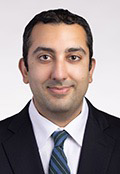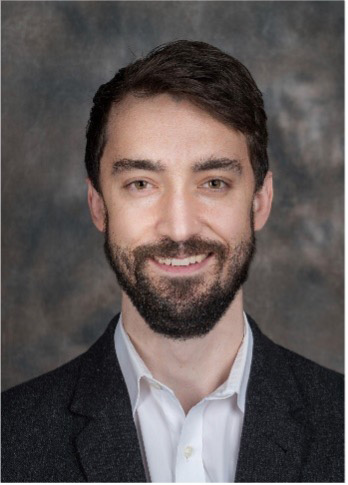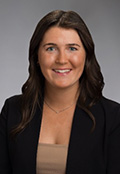2025 Award and Grant Recipients
Below are brief biographies for American Skin Association's 2025 awardees. Among the information included is the title of the grant, the name of the sponsoring institution and the focus of the grant recipient's research. These grants are made possible by support from individuals, corporations and foundations. ASA appreciates the generosity of our supporters.
-

Patrick Brunner, MD, MSc
2025 ASA Calder Investigative Scientist Award in Vitiligo
Icahn School of Medicine at Mount Sinai
Topic: Tape-strip profiling of patients with vitiligoDr. Brunner obtained his MD degree from the Medical University of Vienna, Austria. He completed his residency in Dermatology at the Department of Dermatology at the Medical University of Vienna (General Hospital Vienna), under the mentorship of Dr. Georg Stingl. Afterwards, Dr. Brunner joined the Laboratory for Investigative Dermatology at The Rockefeller University in New York, obtaining a Master’s Degree in Clinical and Translational Sciences, and performed research on atopic dermatitis under the mentorship of Drs. Emma Guttman and James G. Krueger. In 2018, he started to build his own research group at the Medical University of Vienna, focusing on cutaneous immunobiology of chronic inflammatory skin diseases and primary cutaneous lymphomas, to better understand how individual immune cells orchestrate skin inflammation in benign and malignant conditions. In 2021, he moved back to New York to join the Icahn School of Medicine at Mount Sinai as Associate Professor of Dermatology and Director of the Cutaneous Lymphoma Clinic at The Kimberly and Eric J. Waldman Department of Dermatology. As a clinician scientist with a strong interest in skin immunology, he is seeing patients suffering from chronic inflammatory skin diseases as well as primary cutaneous immune cell malignancies. He is also heading a translational research group aiming at a better understanding of the immunobiology in cutaneous lymphomas, atopic dermatitis and vitiligo, and to develop better treatment modalities for this patient population.
-

Anna Eisenstein, MD, PhD
2025 ASA Sanofi Regeneron Investigative Scientist Award in Atopic Dermatitis
Yale University
Topic: Skin inflammation of atopic dermatitis mediate lung and esophageal allergic immune responsesAnna Eisenstein, MD PhD, is an Assistant Professor of Dermatology at the Yale School of Medicine and a board-certified dermatologist. She completed undergraduate studies at Middlebury College, received her MD and PhD from Boston University School of Medicine and completed dermatology residency and post-doctoral training at the Yale School of Medicine. During her post-doctoral training in the laboratory of Dr. Andrew Wang in the Department of Immunobiology, Dr. Eisenstein established a novel mechanism of action of commonly used nonsteroidal anti-inflammatory drugs and how these and other industrial xenobiotics play a role in the development of allergic disease. Moreover, her work established a novel paradigm of remote priming whereby skin injury can promote development of allergic sensitization to antigens at a distal barrier site. In clinical practice, she specializes in the care of individuals with chronic inflammatory skin diseases, including atopic dermatitis and hidradenitis suppurativa, and is the Director of the Yale Hidradenitis Suppurativa clinic. Dr. Eisenstein is interested in understanding how environmental factors and disturbance of the skin barrier impact inflammatory skin diseases like atopic dermatitis and how this mediates systemic inflammatory responses.
-

Jinwoo Lee, MD, PhD
2025 ASA Sun Pharma Investigative Scientist Award
Stanford University
Topic: Assessing the Role of RNA-Protein Particles in Autoimmune Skin DiseasesDr. Jinwoo Lee is a physician–scientist and Instructor of Dermatology at Stanford University. He received his B.S. in biology from Caltech and his M.D./Ph.D. from the UCSF Medical Scientist Training Program. He completed dermatology residency and postdoctoral research training at Stanford. His research focuses on the molecular basis of sex differences in autoimmune skin diseases, with an emphasis on XIST ribonucleoprotein complexes and autoantibody responses in scleroderma and dermatomyositis. By combining mouse models of autoimmunity and clinical cohorts with immune profiling, his work seeks to identify new biomarkers and therapeutic targets. His research has been recognized with multiple awards from the Dermatology Foundation and the Society for Investigative Dermatology.
-

Nicholas Gulati, MD, PhD
2025 ASA Sun Pharma Investigative Scientist Award
Icahn School of Medicine at Mount Sinai
Topic: Assessing mechanisms underlying stable vs progressing lesions in vitiligoNicholas Gulati, MD, PhD is an Assistant Professor of Dermatology at the Icahn School of Medicine at Mount Sinai, where he directs the Oncodermatology and Early Detection of Skin Cancer Clinics. Prior to joining Mount Sinai, he was a transitional year intern at Memorial Sloan Kettering Cancer Center and a dermatology resident at NYU Grossman School of Medicine. While at NYU, he completed a postdoctoral fellowship in the institution's Interdisciplinary Melanoma Cooperative Group. He received his BA in Biology from Columbia University, his MD from Weill Cornell Medical College, and his PhD from The Rockefeller University. He completed his PhD thesis work in the laboratory of Dr. James Krueger, where he developed expertise in performing translational studies on human skin samples. His research interests include studying the pathogenesis of inflammatory skin diseases and cutaneous drug reactions.
-

Christine Yokoyama, MD, PhD
2025 ASA Johnson & Johnson Research Scholar Award in Psoriasis
Washington University in St. Louis
Topic: Regulation of epidermal homeostasis by centrosomal protein CEP43Christine Yokoyama, MD, PhD is a physician scientist and Instructor of Dermatology in the Department of Internal Medicine at Washington University in St. Louis. She received her MD and PhD in Immunology from Washington University, where she also completed her Internal Medicine internship and Dermatology residency training. Her clinical and research interests focus on mechanisms of innate immune activation in the skin, with the goal to identify novel pathways and mechanisms underlying cutaneous inflammatory diseases.
-

Benjamin Casterline, MD, PhD
2025 ASA Research Grant in Atopic Dermatitis
University of Missouri
Topic: Alpha-gal Sensitization in Atopic Dermatitis: Defining a Novel Immunological EndotypeBenjamin W. Casterline, MD, PhD is an Assistant Professor of Dermatology at the University of Missouri School of Medicine. He received his MD and PhD through the Medical Scientist Training Program at the University of Chicago, where he studied with the Committee on Immunology. His doctoral research investigated enteric microbial inheritance and was supported by an NIH F30 fellowship. The ASA-funded project aims to identify whether atopic dermatitis patients with alpha-gal syndrome, or tick-induced red meat allergy, represent a distinct phenotype that may benefit from specialized prevention and treatment approaches. Dr. Casterline's research and clinical interests center on the dermatologic health challenges facing Midwestern communities, where environmental factors create distinctive patterns of skin disease that require targeted investigation and care.
-

Courtney Matson, PhD
2025 ASA Mulvaney Family Foundation Research Grant in Vitiligo
University of Minnesota
Topic: Tissue-resident memory T cells as a novel therapeutic target in vitiligoCourtney Matson, PhD, is a postdoctoral fellow in the Center for Immunology at the University of Minnesota Medical School. Dr. Matson received her PhD from the University of Maryland Medical School in 2020 under the supervision of Dr. Nevil Singh, where she studied activation thresholds of T cells in cancer and autoimmunity. Dr. Matson is currently mentored by Dr. David Masopust, where she is investigating the role of tissue-resident memory (TRM) T cells in health and disease. Dr. Matson’s research focuses on vitiligo where she aims to disentangle the role of TRM CD8 T cells in initiation, maintenance, and reversal of depigmentation. This research aims to identify novel therapeutic strategies targeting TRM CD8 T cells to durably reverse depigmentation in vitiligo and extend these findings to other T cell-mediated cutaneous autoimmune conditions.
-

Saloni Patel
2025 ASA Mulvaney Family Foundation Medical Student Grant in Vitiligo
Johns Hopkins University School of Medicine
Topic: Quantifying Cardiovascular Risk and Immune Dysregulation in Cutaneous Lupus Erythematosus Using Non-Invasive Vascular Testing and Single-Cell TranscriptomicsSaloni Patel is a fourth-year medical student at the Johns Hopkins University School of Medicine. She graduated summa cum laude from the University of Houston with a degree in Biomedical Sciences. During her clinical research fellowship at the Johns Hopkins Department of Dermatology’s Cutaneous Autoimmune Connective Tissue Diseases Clinic, she developed a strong interest in rheumatologic dermatology. Her research leveraged single-cell and spatial transcriptomics to uncover disease mechanisms in cutaneous lupus erythematosus and dermatomyositis. Saloni aims to pursue a career in dermatology, with a dedicated focus on medical dermatology, skin of color, and promoting health equity.
-

Michelle Verghese
2025 ASA Christopher Andrew Te-Jiong James Medical Student Grant in Melanoma
University of Chicago
Topic: Investigating the role of ALKBH1 in melanoma pathogenesis and anti-tumor immunityMichelle Verghese is an MD/PhD student at the University of Chicago conducting research in the lab of Yu-Ying He, PhD. Her work focuses on characterizing the role of RNA modifications and their regulatory enzymes in UV-induced skin carcinogenesis, melanoma, and anti-tumor immunity. Prior to medical school, Michelle received her BA in Molecular and Cell Biology from the University of California, Berkeley, where she completed a senior thesis on kinase specificity profiling in the lab of Dr. John Kuriyan. She subsequently worked in the lab of Dr. Ben Pinsky at Stanford University, developing diagnostic tools for SARS-CoV-2. Broadly, her research interests include the molecular mechanisms underlying skin cancer development, immune evasion, and therapeutic resistance.
-

Maya Deshmukh
2025 ASA Christopher Andrew Te-Jiong James Medical Student Grant in Melanoma
Yale University
Topic: DNA Hypomethylation as a Strategy to Potentiate Anti-Tumor CD8+ T Cell Function in MelanomaMaya Deshmukh is a seventh-year MD-PhD candidate at Yale University. She earned her undergraduate degree from the University of Michigan, where she studied molecular biology and fine art and conducted research in structural and molecular biology. As a Fulbright Fellow in the lab of Prof. Meytal Landau, she applied X-ray microcrystallography to study amyloid-forming peptides at the host–microbe interface. She then conducted research with Drs. Karen Anderson and William Jorgensen, structurally characterizing a novel pharmacophore targeting the SARS-CoV-2 main protease. Her doctoral research in the labs of Drs. Marcus Bosenberg, Karen Anderson, and Goran Micevic at Yale focuses on how epigenetic alterations contribute to CD8+ T cell exhaustion in melanoma, with the goal of identifying strategies to improve immunotherapy responses. Her clinical and research interests include dermato-oncoloy and women's health dermatology.
-

Haniyah Shareef
2025 ASA Christopher Andrew Te-Jiong James Medical Student Grant in Melanoma
Stanford University School of Medicine
Topic: Investigating the Impact of Telomere Length and Telomere Maintenance on High Burden Melanoma DevelopmentHaniyah Shareef is an M.D. candidate at Stanford University School of Medicine. She earned her undergraduate degree in Biological Engineering with a concentration in Computer Science from the Massachusetts Institute of Technology (MIT). Her prior research has spanned liver tissue regeneration, enteroscopic robotics, and RNA-based biosensors. Currently, her work in the Stanford Department of Dermatology focuses on telomere biology and genetic susceptibility in patients with melanoma. Outside of medicine, she enjoys teaching fitness classes and hiking.
-

Sara Khoshniyati
2025 ASA Christopher Andrew Te-Jiong James Medical Student Grant in Melanoma
Johns Hopkins University School of Medicine
Topic: Metabolic Reprogramming of Tumor-Infiltrating Immune Cells Following PBAE-mediated 4-1BBL/IL-12 Treatment in a Murine Melanoma ModelSara Khoshniyati is a third-year medical student at the Johns Hopkins School of Medicine. Originally from California, she graduated from the University of Southern California where she studied stem cell responses to injury. Her research interests lie in cutaneous oncology and inflammatory skin disease, with a focus on immune and metabolic pathways. Sara plans to pursue a career in dermatology with an emphasis on translational research and cancer immunology.
-

Olivia McGeough
2025 ASA Christopher Andrew Te-Jiong James Medical Student Grant in Melanoma
Icahn School of Medicine at Mount Sinai
Topic: Survey study on the surgical management of dysplastic neviOlivia McGeough is a medical student at Rutgers Robert Wood Johnson Medical School, currently completing a research fellowship under the mentorship of Dr. Jesse Lewin at the Icahn School of Medicine at Mount Sinai. She graduated from the University of Michigan with a bachelor's degree in biopsychology, cognition, and neuroscience. During medical school, Olivia engaged in clinical research that strengthened her interest in advancing medical knowledge and translating evidence into improved patient care. Her research interests include cutaneous oncology and immune-mediated skin diseases, with a particular focus on advancing diagnostic methods and optimizing disease management.
-

Jaanvi Mehta
2025 ASA Christopher Andrew Te-Jiong James Medical Student Grant in Melanoma
Icahn School of Medicine at Mount Sinai
Topic: Use of machine learning to diagnose melanoma from non-invasive reflectance confocal microscopy imagesJaanvi Mehta is a medical student at Sidney Kimmel Medical College at Thomas Jefferson University and a pre-doctoral research fellow under the mentorship of Dr. Nicholas Gulati at the Icahn School of Medicine at Mount Sinai. She graduated summa cum laude from the University of Delaware in 2022 with bachelor’s degrees in Biological Sciences, Women and Gender Studies, and Liberal Studies. Her research interests include immune mechanisms in oncodermatology, cutaneous oncology, and inflammatory and rheumatologic dermatoses. She hopes to pursue a career in academic dermatology that combines innovation and translational medicine with compassionate care for patients with dermatologic disease.
-

Brandon Block
2025 ASA Christopher Andrew Te-Jiong James Medical Student Grant in Melanoma
Icahn School of Medicine at Mount Sinai
Topic: Defining melanoma and other skin cancer characteristics differentiating young versus older adultsBrandon Block is an MD/MSCR student at the Icahn School of Medicine at Mount Sinai, currently completing his scholarly year in the lab of Dr. Nicholas Gulati. He graduated summa cum laude from the University of Pennsylvania in 2022 with a bachelor’s degree in biology and classical studies. Brandon's research interests center around the immunologic mechanisms underlying cutaneous toxicities of cancer therapies and the management of these conditions. His master’s thesis project involves the use of non-invasive tape-strip techniques to elucidate the effect of dupilumab treatment on the skin of patients who experience immunotherapy-induced rashes. Outside of the lab, Brandon enjoys running in Central Park, listening to podcasts, and trying out new dessert recipes.
-

Hope Winfield
2025 ASA Hambrick Medical Student Grant
University of Virginia
Topic: Investigating the genomic consequence of immunosuppression in sebaceous carcinomaHope Winfield is an MD candidate at the University of Virginia School of Medicine (UVA SOM). She earned her undergraduate degree from Duke University in political science. During her time at UVA SOM, she has been involved in clinical trials research through the Institute for Dermatologic Research and Advancement (IDRA), as well as projects investigating the impact of financial toxicity on quality of life in patients with hidradenitis suppurativa (HS) and a quality improvement initiative to streamline monitoring of nonbiologic systemic medications frequently utilized in the management of dermatologic conditions. Her current work in the Department of Dermatology aims to elucidate the genomic impact of immunosuppressing medications in sebaceous carcinoma.
-

Maya Hagander
2025 ASA Hambrick Medical Student Grant
University of Virginia
Topic: Targeting ret activation in atopic dermatitisMaya Hagander is a third-year medical student at the University of Virginia School of Medicine. She graduated summa cum laude from Wittenberg University with honors in Biochemistry and Molecular Biology. Her clinical interests include inflammatory skin disease, cutaneous malignancies, and skin of color. Her current research in the laboratory of Dr. Carolyn Lee investigates the role of RET signaling in keratinocyte differentiation and skin barrier dysfunction in atopic dermatitis to identify novel preventive and therapeutic targets. She grew up in Daegu, South Korea and Lakenheath, England.
Recipients list by year:
2024 |2023 | 2022 | 2021 | 2020 | 2019 | 2018 | 2017 | 2016 | 2015 | 2014 | 2013 | 2012




